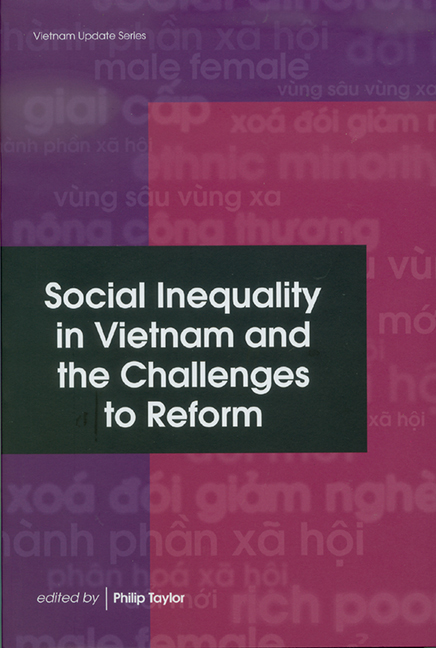Book contents
- Frontmatter
- Contents
- List of Tables
- List of Figures
- Preface
- Introduction: Social Inequality in a Socialist State
- 1 Vietnam's Recent Political Developments
- 2 Vietnam's Recent Economic Reforms and Developments: Achievements, Paradoxes, and Challenges
- 3 Behind the Numbers: Social Mobility, Regional Disparities, and New Trajectories of Development in Rural Vietnam
- 4 From Collectivization to Globalization: Social Differentiation in a Muong Ethnic Community of Vietnam
- 5 Political Capital, Human Capital, and Inter-generational Occupational Mobility in Northern Vietnam
- 6 Social Disparities in Vietnam: The Case of Poverty Reduction and Educational Attainment
- 7 Redressing Disadvantage or Re-arranging Inequality? Development Interventions and Local Responses in the Mekong Delta
- 8 The Politics of Land: Inequality in Land Access and Local Conflicts in the Red River Delta since Decollectivization
- 9 Female Garment Workers: The New Young Volunteers in Vietnam's Modernization
- 10 Class, Nation, and Text: The Representation of Peasants in Vietnamese Literature
- 11 Leisure and Social Mobility in Ho Chi Minh City
- Index
- About the Contributors
- Publications in the Vietnam Update Series
4 - From Collectivization to Globalization: Social Differentiation in a Muong Ethnic Community of Vietnam
Published online by Cambridge University Press: 21 October 2015
- Frontmatter
- Contents
- List of Tables
- List of Figures
- Preface
- Introduction: Social Inequality in a Socialist State
- 1 Vietnam's Recent Political Developments
- 2 Vietnam's Recent Economic Reforms and Developments: Achievements, Paradoxes, and Challenges
- 3 Behind the Numbers: Social Mobility, Regional Disparities, and New Trajectories of Development in Rural Vietnam
- 4 From Collectivization to Globalization: Social Differentiation in a Muong Ethnic Community of Vietnam
- 5 Political Capital, Human Capital, and Inter-generational Occupational Mobility in Northern Vietnam
- 6 Social Disparities in Vietnam: The Case of Poverty Reduction and Educational Attainment
- 7 Redressing Disadvantage or Re-arranging Inequality? Development Interventions and Local Responses in the Mekong Delta
- 8 The Politics of Land: Inequality in Land Access and Local Conflicts in the Red River Delta since Decollectivization
- 9 Female Garment Workers: The New Young Volunteers in Vietnam's Modernization
- 10 Class, Nation, and Text: The Representation of Peasants in Vietnamese Literature
- 11 Leisure and Social Mobility in Ho Chi Minh City
- Index
- About the Contributors
- Publications in the Vietnam Update Series
Summary
Over the last decade, social differentiation in Vietnam has been one of the most discussed issues among both academics and policy-makers. The reason for this growing interest lies in the assumption that Vietnam had been a rather equal society during the collective period from the early 1960s to the mid-1980s, and that it has since become differentiated due to reform policies launched towards the end of that period.
But what does the term “social differentiation” imply exactly in the Vietnamese context? Researchers and policy-makers view this new phenomenon from different angles, as reflected in their use of language. Some document different forms of bat binh dang (inequalities), with an emphasis on income and wealth disparities. Others highlight the processes that lead to such inequalities — phan tang xa hoi (stratification), or more specifically phan hoa giau ngheo (economic differentiation). Still others, although fewer, choose to study the process of phan hoa giai cap (class differentiation).
Such variety in research emphases carries both political and policy implications. Some consider inequality as a necessary outcome of the market economy, and are mostly concerned with mitigating obstacles that might lay on the road to economic growth, such as corruption and other so-called social evils. Others are worried that economic inequality might lead to the re-emergence of classes and related exploitation, against which the Vietnamese state had bitterly fought, and on whose suppression it continues to base part of its legitimacy.
Whatever their political agenda, researchers on Vietnam have the same problem as the literature on differentiation in general, that is, the failure to provide a clear distinction between forms and processes of differentiation. This is despite a substantive epistemic contribution by Ben White in 1989, which, instead of debating the merits of different theories of differentiation, focuses on the aspects of differentiation, namely causes, mechanisms, and indicators that are specific to a particular context (pp. 25–26). Moreover, while studying differentiation implies the documentation of different forms of inequality, White's analysis emphasizes processes of changing relations, notably, of production, between different social groups (pp. 19–20).
- Type
- Chapter
- Information
- Social Inequality in Vietnam and the Challenges to Reform , pp. 123 - 165Publisher: ISEAS–Yusof Ishak InstitutePrint publication year: 2004



